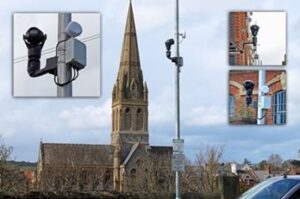
360 Vision Technology, a UK manufacturer of ruggedised HD, radar and thermal PTZ surveillance cameras, has been integral to a long-term CCTV upgrade programme across the city of Exeter in the UK.
Installed by Select Electrics and specified by Derek Maltby of Global MSC Security, with funding from the Safer Streets 2 initiative, the need for the expansion and modernisation of the existing Exeter analogue-based CCTV network, to IP- based, began two years ago.
The scope of the Exeter City Council project was for coverage of additional areas identified as requiring protection for students, routes used by lone women during evenings, and parts of the town centre not covered by the existing camera surveillance network, including additional streets and city centre car parks.
Operating a completely analogue system, Exeter City Council also required replacement of several cameras that were beginning to fail, in addition to expanding surveillance coverage to the required new areas. Not wanting to just replace the existing camera network with the same analogue technology, management in the Exeter control room had a long-term vision to upgrade to completely IP transmission, and to a new state-of-the-art video management system (VMS), to ensure the long-term performance and capability of the system.
“Not only would budgets not allow the replacement of the entire camera network in one global switchover, but we could not afford the system downtime that switching all the network to IP transmission in one step would necessitate.” says Dennis Cavanagh, Control room Operations Manager, Exeter City Council.
To bridge the gap, Exeter City Council deployed the 360 Vision Invictus camera, with its innovative high-performance hybrid technology. This enabled the replacement of the existing analogue cameras, with all the latest camera functionality and quality required, but with a built-in capability to convert them into IP transmission devices – literally at the ‘flick of a switch’ once the Exeter network had become IP ready. This would be implemented on a manageable scale too, switching to IP one zone at a time.
“As well as IP camera transmission, we were also looking to update our control room VMS to IP technology, so the ability to ‘switch’ our new cameras’ transmission in sync with this was critical to the project’s success.” says Dennis. “The Invictus Hybrid camera technology has proved to be a great solution for us, one that really has bridged the gap between the analogue and IP transmission worlds and, importantly for us, meant that we didn’t waste investment on new analogue only cameras that would need to be replaced long before the end of their service life.”
“Thirty Invictus Hybrid cameras were installed across our network, in several small, easily manageable projects of camera replacement.” says Dennis. “Each time a camera was replaced, we saw a vast improvement in image quality with more detail and ease of control for operators, along with recording and instant playback benefits too. In areas where street lighting was at a premium, Invictus Hybrid cameras with integral infrared and white light capability were used. This functionality provided uninterrupted high quality imagery during hours of darkness, with the ability to switch on white light functionality from the control room, making subjects aware that they are being monitored – either as a warning or for reassurance.”
Linked to a fibre-optic network installed by the council in a co-funded partnership between the University of Exeter, the Royal Devon and Exeter Hospital, and Exeter City Council, images from the replacement and additional new cameras are transmitted back to the City Council’s control room.
In areas where access to the fibre network was difficult, or local protected infrastructure such as architecture or historical cobbles were present, an alternative solution had to be found.
In these instances, a network of ruggedised Invictus Hybrid PTZ cameras were again deployed, but this time equipped with innovative 360 Vision TX wireless technology, to enable simple connection to the main fibre network via built-in sophisticated video streaming over mobile phone networks.
360 Vision Technology’s TX wireless video camera transmission technology delivers camera video & PTZ control from just 6 Kbps, full 1080p HD edge recording / remote retrieval on demand and saves the council time and money on fixed infrastructure camera video transmission installation costs and on-going cost of ownership.
Delivering high-quality camera video over low bandwidth, 360 Vision Technology’s 3G/4G/LTE TX wireless CCTV camera range provides a reliable wireless video transmission solution, even within difficult wireless video transmission environments. Additionally, these cameras use highly efficient optimised video compression, with unique minimal latency that is fully encrypted and secure.
Keeping running costs to a minimum, the TX Range of 3G/4G/LTE TX wireless CCTV cameras operate without the need for expensive airtime contracts. With complete control of bandwidth used, operators can choose the resolution and frame rate to transmit, dependent on the bandwidth available. Additionally, operators can switch dynamically between low and high bandwidth video streams, dependent on network capability, adjusting CCTV camera video quality to suit.
Jason Wyatt, National Account Manager at 360 Vision Technology said: “Using the ruggedised Invictus Hybrid PTZ camera in its true dual hybrid mode has allowed Exeter City Council to add new, cutting-edge camera surveillance to their existing analogue system over the years, without the requirement for an immediate infrastructure upgrade. As their infrastructure has changed to IP, with full Genetec IP VMS in the control room, operators and Exeter Council management were able to benefit from stunning HD imaging and IP control at the flick of a switch, with no other camera hardware changes involved.”











